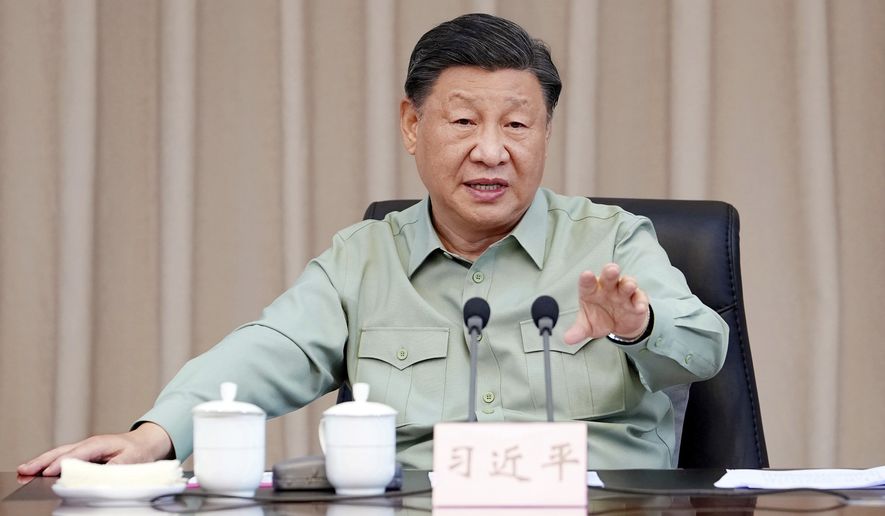Chinese President Xi Jinping urged top security officials of the ruling Communist Party this week to modernize the country’s national security system and warned them to be ready for “worst-case” scenarios amid growing tensions with the United States.
Mr. Xi, who is also general secretary of the party and chairman of its Central Military Commission, said during the first meeting of the national security commission that China must understand the current challenging security environment, according to state media.
“The complexity and difficulty of the national security issues we now face have increased significantly,” Mr. Xi said Tuesday, according to the official Xinhua news agency. “We must adhere to bottom-line thinking and worst-case-scenario thinking and get ready to undergo the major tests of high winds and rough waves, and even perilous, stormy seas.”
Mr. Xi, who earlier this year explicitly accused Washington of trying to “encircle” and “suppress” China, urged the assembled officials to increase efforts to safeguard China’s socialist development by building a new security framework, and break new ground on national security work, official reports said.
The comments reflect a major shift in policy under Mr. Xi, who has sought to revive communism under his brand of ideology known as Marxism-Leninism with Chinese characteristics for a new era. Since coming to power in 2012, Mr. Xi has moved away from economic liberalization and political reform toward imposing stringent restrictions he believes will prevent China from going the way of the Soviet Union.
China’s government has blamed the collapse of the Soviet empire in 1991 on “historical nihilism,” defined as all ideologies and concepts that run counter to accepted Communist Party narratives.
Mr. Xi ordered party members in 2021 to study history and emphasized ideological adherence to advancing the communist revolution.
He denounced historical nihilism as dangerous and a threat to China’s view of history as moving toward socialist, anti-capitalist revolution.
The latest remarks by the Chinese leader were made against the backdrop of a worsening economy and increased tensions with the United States.
U.S. Defense Secretary Lloyd Austin, stopping in Japan Thursday on his way to a major regional security summit in Singapore, told reporters it was “unfortunate” that Chinese Defense Minister Li Shangfu had turned down an invitation for a meeting while the two were at the gathering. Beijing has cited U.S. sanctions on Chinese officials — including Mr. Li — as the reason for the snub.
“I think that is unfortunate,” Mr. Austin said. “I would welcome any opportunity to engage with Li. I think defense departments should be talking to each other on a routine basis or should have open channels for communications.”
And last week, Adm. John Aquilino, commander of the Hawaii-based Indo-Pacific Command, bluntly warned Mr. Xi that any conflict with the United States over Taiwan will result in devastating losses of “blood and treasure.”
U.S. military leaders have warned that the odds of a war with China have increased in recent years as a result of Mr. Xi directing the People’s Liberation Army to be ready for operations against Taiwan by 2027.
At the same time Beijing is playing hardball in refusing meetings with U.S. officials, China recently welcomed American business leaders Tim Cook of Apple and Elon Musk of Tesla as part of a bid to reinvigorate flagging foreign investment.
Mr. Xi said in his remarks Tuesday that the new security system should render the organs more effective in “actual combat and practical use.” China also needs to continue advancing a national risk-monitoring and early-warning system, boost security education and improve the management of databases and artificial intelligence security, he said.
China’s security system includes large military forces of the PLA and a corollary internal security force known as the People’s Armed Policy. The Ministry of State Security and Ministry of Public Security also conduct operations against any elements of society deemed a threat to CCP rule.
Foreign businesses in China were recently targeted by authorities suspected of intelligence-gathering as part of a crackdown on due diligence and financial companies viewed as security threats. The crackdown followed the announcement of new national security regulations aimed at protecting state secrets.
Bill Bishop, a China analyst, wrote on his Substack page that other senior security officials took part in the initial commission session.
“Everything in Xi’s PRC is national security and there is an intensifying focus on better coordinating security and development, with the security side winning out over the economics side, it appears,” he stated. “There is also an intensifying hardening of the system against all sorts of threats foreign and domestic.”
• Bill Gertz can be reached at bgertz@washingtontimes.com.




Please read our comment policy before commenting.